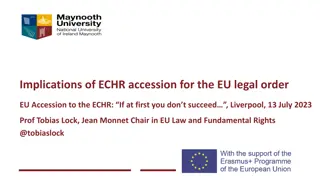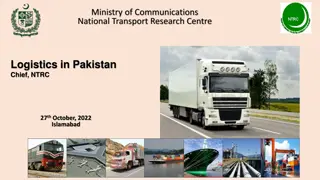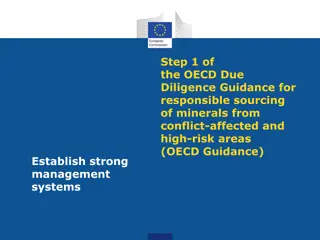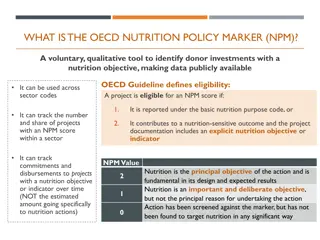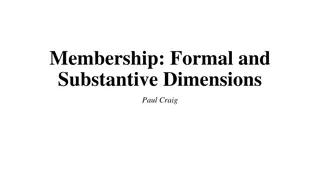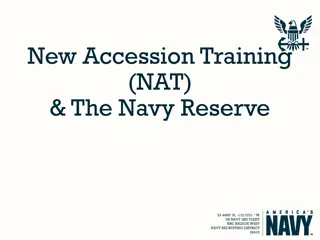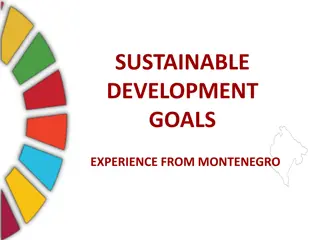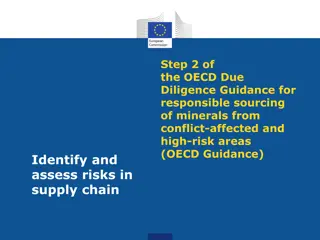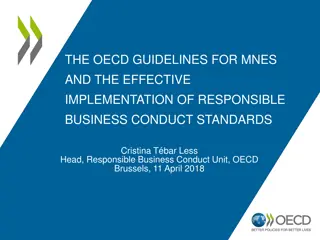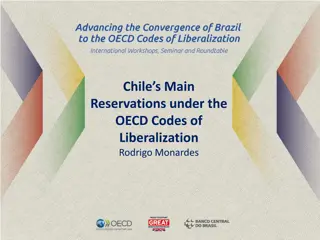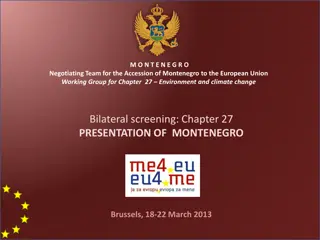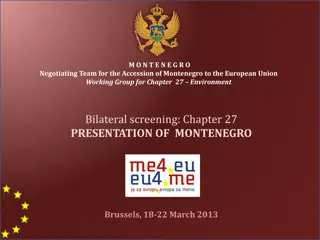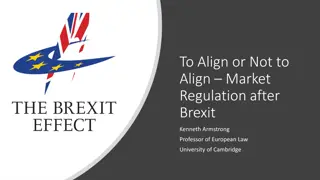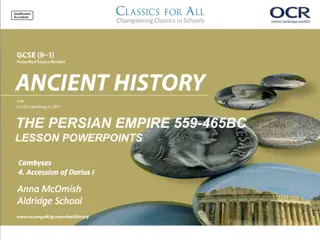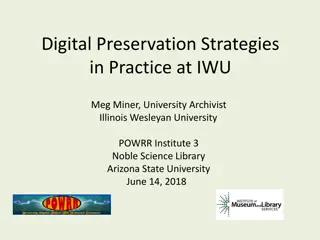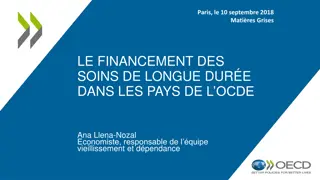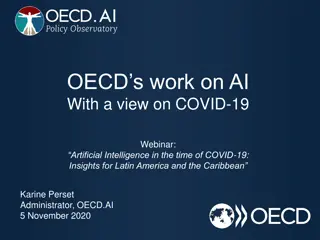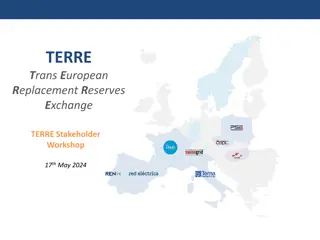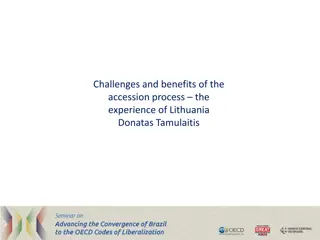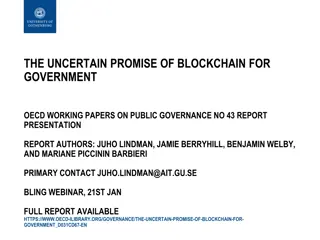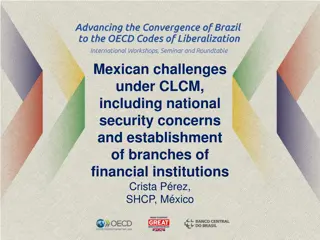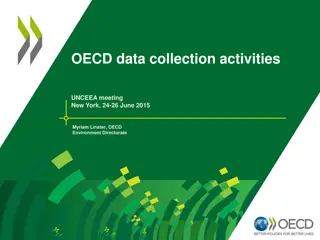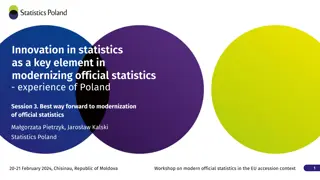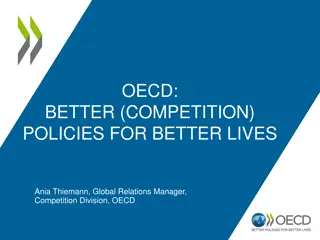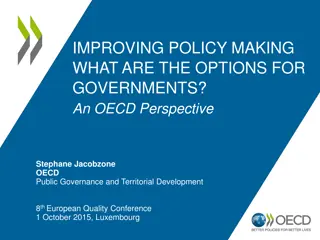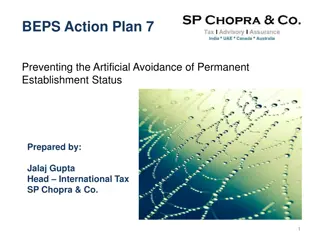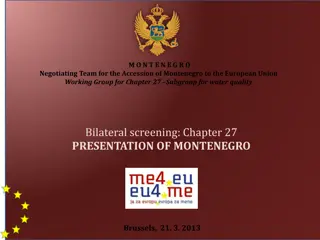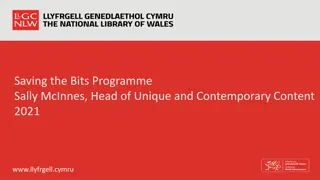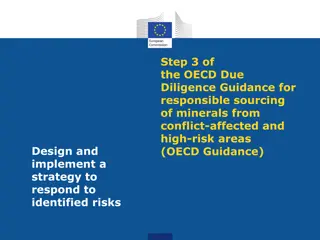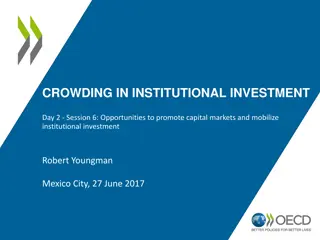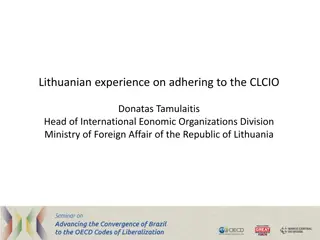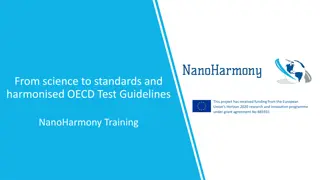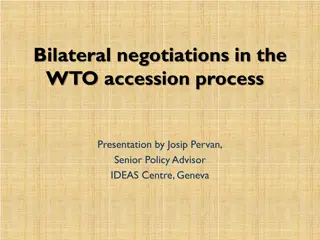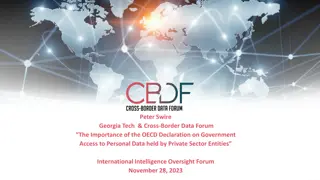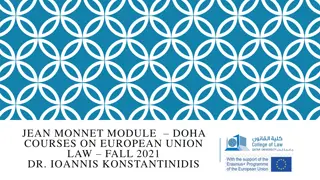Achieving Effective Delivery of Infrastructure Projects: Insights from OECD Seminar
Infrastructure investments play a crucial role in global development, but their successful delivery is becoming increasingly complex. Issues such as governance, ownership, and policy responsiveness can impact project outcomes. Without strategic management, projects may face challenges like inadequat
0 views • 24 slides
SUSTAINABLE WATER USE FOR GREEN HYDROGEN PRODUCTION: PRELIMINARY INSIGHTS FROM OECD WORK IN MONGOLIA
Preliminary insights from OECD work in Mongolia discuss the impact of green hydrogen production on water, sustainable approaches, and possible ways forward. The Sustainable Infrastructure Programme in Asia supports the transition towards net-zero infrastructure with a focus on enabling policies, pla
0 views • 14 slides
Challenges and Progress in Chilean Infrastructure Development
The challenges of Public-Private Partnerships (PPPs) in Chile within the framework of best practices and international standards are discussed, highlighting the need for long-term infrastructure planning and enhanced governance. The 2017 OECD Infrastructure Governance Review identified deficiencies
4 views • 40 slides
Challenges and Opportunities in Monitoring and Evaluation in OECD Countries
Monitoring and evaluation in OECD countries present unique challenges and opportunities, requiring clear mandates, ongoing processes, and robust institutional frameworks. The OECD approach emphasizes fostering quality, ensuring impact, and sharing lessons learned for efficient resource management. I
2 views • 12 slides
Implications of ECHR Accession for EU Legal Order: Prof. Tobias Lock's Insights
Explore the implications of EU accession to the ECHR in Prof. Tobias Lock's presentation. Delve into the new role of the EU as a gatekeeper, inter-institutional dynamics, the Court of Justice's role, and the potential impact on fundamental rights protection within the EU legal framework. Discover th
5 views • 16 slides
Challenges and Opportunities in Pakistan's Freight and Logistics Sector
The National Transport Research Centre in Pakistan is focusing on the logistics sector to enhance the country's competitiveness. The National Freight & Logistics Policy aims to address various challenges such as an outdated truck fleet, bottlenecks in port access, and outdated transport laws. Effort
1 views • 21 slides
OECD Due Diligence Guidance: Establish Strong Management Systems
The OECD Due Diligence Guidance outlines the importance of establishing strong management systems for responsible sourcing of minerals from conflict-affected and high-risk areas. This involves adopting company policies, engaging with suppliers, implementing grievance mechanisms, and utilizing the 3P
0 views • 13 slides
Understanding the OECD Nutrition Policy Marker (NPM)
The OECD Nutrition Policy Marker (NPM) is a voluntary tool to identify donor investments with a nutrition objective. It helps mainstream nutrition in large-scale programs to improve outcomes and accountability. The NPM is applied at the project level to track investments and promote transparency in
1 views • 4 slides
Dimensions of Membership in the European Union
The formal and substantive dimensions of membership in the European Union are outlined, including the criteria for accession and withdrawal. Formal criteria involve unanimity, consent of the European Parliament, and ratification of agreements, while substantive requirements focus on a state's commit
0 views • 22 slides
New Accession Training (NAT) & The Navy Reserve Program Details
Program Requirements designed to address critical Navy Selected Reserve manning shortfalls, including training pipeline details, drill pay structure, Montgomery GI Bill benefits, and Post 9/11 GI Bill qualification criteria for Reservists. The program aims to provide comprehensive training and benef
0 views • 27 slides
Sustainable Development Goals Experience in Montenegro
Experience the sustainable development journey in Montenegro, featuring the creation and monitoring of the National Strategy for Sustainable Development, indicators reporting systems, EU accession processes, and institutional setup. Explore Montenegro's geographical context, population growth, GDP,
1 views • 14 slides
Responsible Sourcing in Conflict-Affected Areas: OECD Guidelines
The OECD Due Diligence Guidance outlines steps for companies to identify and assess risks in mineral supply chains from conflict-affected and high-risk areas. It explains Conflict-Affected and High-Risk Areas (CAHRAs) and the importance of due diligence in responsible mineral sourcing to avoid finan
4 views • 16 slides
OECD Guidelines for Responsible Business Conduct
The OECD Guidelines for Multinational Enterprises provide a framework for responsible business conduct, encouraging sustainable practices and minimizing negative impacts. The OECD's work on responsible business conduct focuses on enhancing economic and social well-being globally, emphasizing ethical
1 views • 30 slides
Chile's Financial Services Liberalization Overview
This content provides an in-depth look at Chile's main reservations under the OECD Codes of Liberalization, including its context of accession to OECD Free Trade Agreements and commitments to liberalization in services, investments, and financial services. It covers aspects such as cross-border trad
5 views • 20 slides
Montenegro Accession to EU: Chapter 27 Environment & Climate
The Montenegro negotiating team is working on Chapter 27 - Environment and Climate Change for the country's accession to the European Union. The presentation covers the legal and institutional frameworks, including laws on forests, inspection supervision, customs, and nature protection. It also outl
0 views • 13 slides
Montenegro EU Accession Negotiating Team for Chapter 27 Environment
The Montenegro EU Accession Negotiating Team for Chapter 27 Environment discussed regulations, legislative frameworks, and institutional frameworks related to environment and climate change. Topics included the EU Timber Regulation, national laws on forests and inspection supervision, as well as the
2 views • 13 slides
OECD Expert Group on Disparities in National Accounts Work Summary
The OECD Expert Group on Disparities in National Accounts focuses on developing methodology to produce distributional results for household income, consumption, and saving. Their work involves adjusting national accounts totals, identifying relevant variables from micro data sources, imputing missin
0 views • 15 slides
Market Regulation Alignment: Pre and Post-Brexit Analysis
Delve into the evolution of market regulation alignment before and after Brexit, exploring key time periods and policy contexts. From the UK's accession to the European Communities to the implications of the Brexit transition, this analysis examines the instrumental choices and democratic oversight
1 views • 11 slides
The Accession of Darius: A Comparative Analysis
Explore the two versions of King Darius's rise to power following Cambyses' death in 522 BC. Compare the accounts from Herodotus and Darius's Bitsitun Inscription, highlighting similarities, differences, and potential propaganda elements. Delve into the intriguing narrative complexities surrounding
0 views • 8 slides
Practical Strategies for Digital Preservation at IWU
Explore digital preservation strategies in practice at Illinois Wesleyan University. Learn from Meg Miner, the University Archivist, about preservation philosophy, local-centric decisions, and the importance of prioritizing digital collections inventory. Gain insights into updates on processing acti
0 views • 33 slides
Financing Long-Term Care in OECD Countries: Insights and Challenges
The funding of long-term care services in OECD countries poses significant financial and organizational challenges, with a growing proportion of the elderly population requiring such services. This article delves into the financing mechanisms, the public funding landscape, and potential reform pathw
0 views • 10 slides
OECD's Work on AI in Response to COVID-19: Insights for Latin America and the Caribbean
OECD is focusing on AI in the context of COVID-19, emphasizing the importance of trustworthy AI for societal benefits. The organization has outlined principles for implementing AI in policies, with a goal of fostering an ecosystem that prioritizes human rights, transparency, accountability, and more
0 views • 18 slides
TERRE Project Stakeholder Workshop Highlights and Future Directions
Delve into the recent TERRE Stakeholder Workshop, exploring topics such as project introduction, participating TSOs, accession timelines, project structure, and future projections. Get insights on the future of the TERRE project with legal context changes and clearings implementation details discuss
0 views • 16 slides
Challenges and Benefits of OECD Accession Process: Experience of Lithuania
The experience of Lithuania in the OECD accession process involves various objectives like national investment regime improvement, safeguarding measures, and coordination efforts with different ministries. Reservations and challenges in areas such as direct investment, real estate operations, and ba
0 views • 8 slides
The Uncertain Promise of Blockchain for Government - OECD Working Paper
This OECD working paper explores the potential impact of blockchain on government operations. Authored by Juho Lindman, Jamie Berryhill, Benjamin Welby, and Mariane Piccinin Barbieri, the report delves into the opportunities and challenges presented by blockchain technology in public governance. Juh
0 views • 19 slides
Challenges Faced by Mexico Under CLCM and Establishment of Financial Institutions
Mexico faced challenges related to national security concerns and the establishment of branches of financial institutions under the Codes of Liberalisation of Capital Movements (CLCM). The country's entry into the OECD in 1994 marked a significant period of liberalization and reforms, including exte
0 views • 13 slides
OECD Data Collection Activities Overview
OECD's data collection activities include interrelated work streams focusing on environmental data and indicators, database development, green growth, sectoral statistics, and regional analysis. The organization aims to provide comprehensive information to support policy-making and promote global co
0 views • 22 slides
Modernizing Official Statistics: Poland's Innovation Experience
Poland's journey in modernizing official statistics involves securing funds, implementing innovative actions, EU accession process, the importance of modernizing statistics, harmonization with EU statistics, and the pros and cons of membership in the European Statistical System. Emphasis is placed o
0 views • 19 slides
Promoting Better Lives Through OECD's Competition Policies
The OECD's Competition Division works towards promoting fairer development, better education, healthcare, pensions, and employment through its outreach programs and global forums. The Global Forum on Competition engages participants from around the world to discuss topics like fighting corruption, p
0 views • 15 slides
Enhancing Policy Making: Options for Governments - An OECD Perspective
Various tools and approaches are discussed to improve policy making, including foresight, cost-benefit analysis, and regulatory tools. The changing context of policy challenges is highlighted, along with the OECD policy toolkit's modular approach. Strategies like talking to leaders, engaging stakeho
0 views • 20 slides
Understanding BEPS Action Plan 7: Preventing Artificial Avoidance of Permanent Establishment Status
The Action 7 Report aims to prevent artificial avoidance of Permanent Establishment (PE) status by making changes to the PE definition in the OECD Model Tax Convention. BEPS refers to tax planning strategies exploiting tax rule gaps to shift profits to low-tax locations. The OECD issued 15 action pl
0 views • 10 slides
Montenegro's Efforts Towards European Union Accession: Chapter 27 on Drinking Water Quality
Montenegro is actively working towards accession to the European Union, specifically focusing on Chapter 27 related to drinking water quality. The negotiation team is presenting Montenegro's progress and alignment with EU standards, emphasizing the legal and institutional frameworks in place for ens
0 views • 16 slides
Enhancing Born-Digital Content Access
Explore methods and policies for accessing born-digital content, including pre-accession documentation, security measures, and tools for rendering file formats. Learn about the OAIS model, levels of access, and collaboration with third-party platforms like Europeana. Enhance researcher support and d
0 views • 12 slides
Responding to Risks in OECD Due Diligence Guidance
Develop and implement a strategic response to identified risks in accordance with the OECD Due Diligence Guidance for responsible sourcing of minerals. The process involves reporting findings to management, devising a risk management plan, implementing the plan, and assessing ongoing risks. Mitigati
0 views • 7 slides
Opportunities to Mobilize Institutional Investment in Capital Markets
Aligning trillions of dollars managed by OECD institutional investors towards green infrastructure investments presents a significant opportunity. Currently, only a small percentage of large pension fund assets are directed towards infrastructure, with an even smaller fraction allocated to green pro
0 views • 4 slides
Lithuanian Journey Towards OECD Accession: Key Coordination Efforts
Lithuanian's experience in adhering to the CLCIO, coordinated by Donatas Tamulaitis, focuses on various processes including OECD accession, communication with Member states, management of recommendations, and more. The journey started in 2014 with the initial list of reservations and progressed thro
0 views • 14 slides
NanoHarmony Training: Standards and OECD Guidelines Overview
Delve into the world of standards and OECD Test Guidelines with the NanoHarmony Training material. Learn about harmonized test methods, the role of science in guideline development, engagement with OECD committees, and the process of creating OECD Test Guidelines. Explore how stakeholders can contri
0 views • 16 slides
Bilateral Negotiations in WTO Accession Process Overview
Learn about the key stages and rules of bilateral negotiations in the WTO accession process. Understand the importance of multiple revisions, regional concessions, and internal organization in negotiating market access. Discover the complexities of tariff negotiations, types of tariffs, and the stra
0 views • 20 slides
Challenges and Importance of Government Access to Personal Data in Cross-Border Intelligence Oversight
Reflecting on the significance of the OECD Declaration on Government Access to Personal Data held by Private Sector Entities, this content delves into the drivers necessitating an OECD-type process, such as law enforcement needs, globalization of criminal evidence, and convergence of civilian commun
0 views • 8 slides
EU Charter of Fundamental Rights and European Convention on Human Rights Overview
The course module on European Union Law in Doha focuses on the EU Charter of Fundamental Rights and its relationship with the European Convention on Human Rights. It covers topics such as the EU's accession to the Convention, external action on human rights, and the differences between the Charter a
0 views • 26 slides




